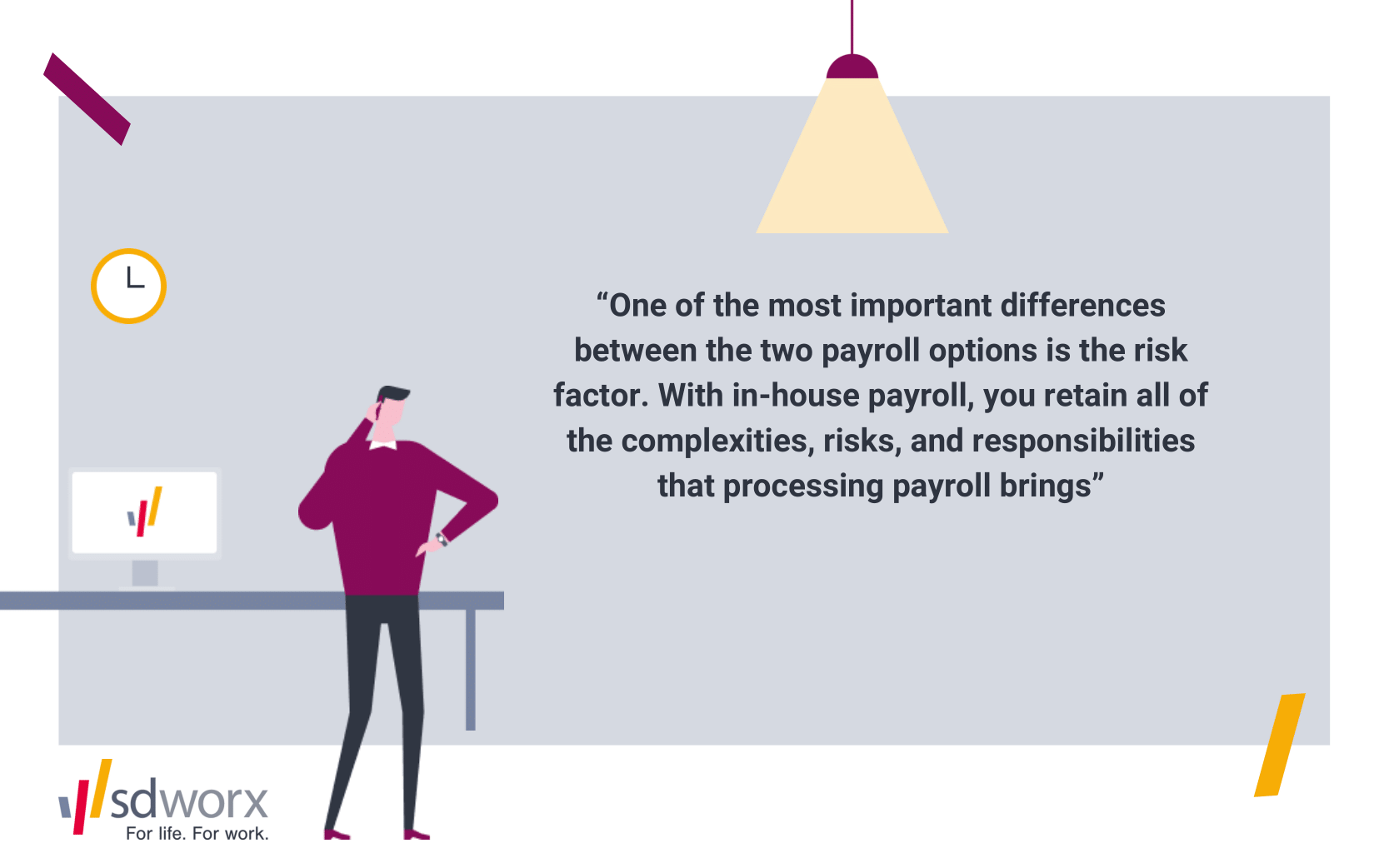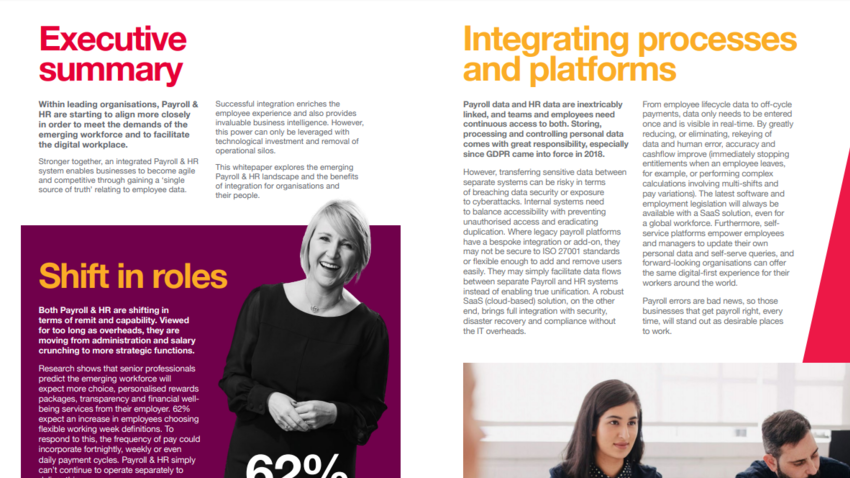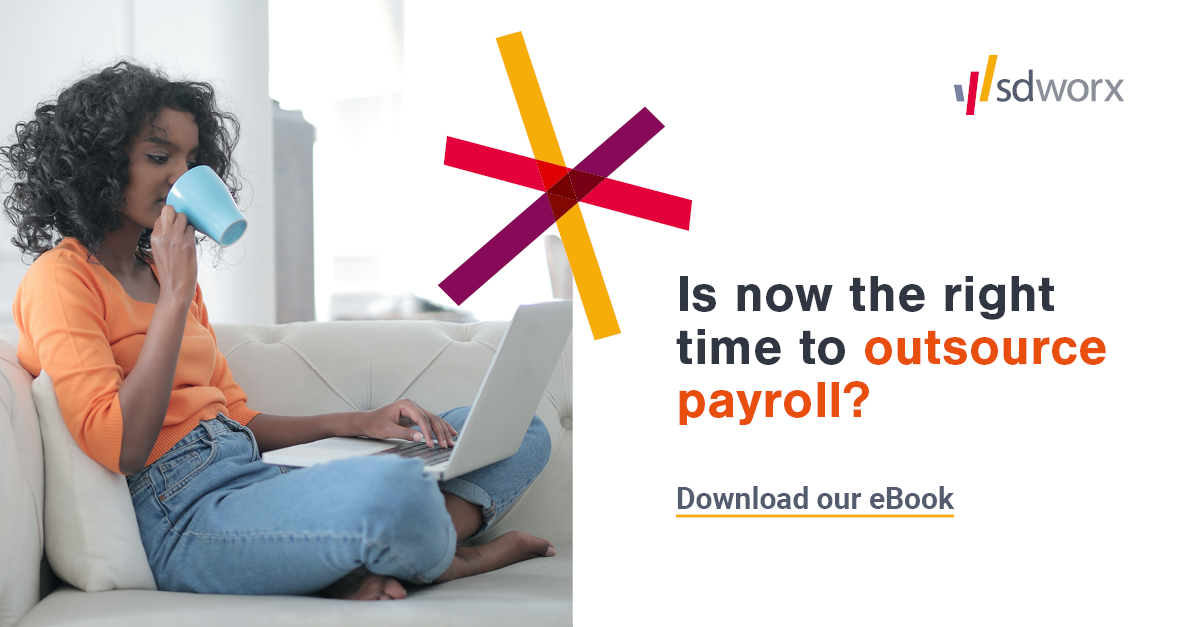
In-house payroll vs managed service
This article is an in-depth look at in-house and managed service payrolls. We explore the key differences, and what factors may inform your decision to retain an in-house payroll or outsource.
If you’ve found yourself reading this guide, it’s quite likely there may have been some discussion within the business about the benefits of a managed payroll service, the potential savings, or the pros and cons of outsourcing. Because we want every customer to make the right decision, we’re always clear that outsourced payroll isn’t the right option for every business, and for some, it’s a great option. This guide will hopefully help you weigh up the benefits of outsourcing versus retaining payroll in-house.
Key Differences Between In-House And Managed Service Payroll
In-House Payroll
If you process payroll internally, you have an in-house payroll. Depending on the size of the business you work for, there may be one person who handles payroll, or a payroll team. An in-house payroll team (or person) are responsible for all aspects of payroll processing including calculating employee pay, running payroll, paying overtime and expense, and processing deductions. An in-house payroll team will also make any necessary payments and report submissions to His Majesty's Revenue & Customs (HMRC).
Businesses that handle payroll internally are more likely to use payroll software, particularly cloud-based solutions. This is often known as a software-only service.
Managed Service Payroll
A managed payroll service is when a business outsources its payroll function to a third-party company. The terminology can get a little hazy here because some providers refer to their service as a ‘managed payroll service’ or ‘outsourced payroll service’. Some companies make a distinction between managed and outsourced, and some use the two terms interchangeably. Confusing right?
Although services vary between providers, the basic principle behind outsourced payroll is that the provider will automatically process payroll for you. Or partly…many providers will offer flexible solutions that let you retain certain elements of payroll in-house.

Summary Of Differences
One of the most important differences between the two payroll options is the risk factor. With in-house payroll, you retain all of the complexities, risks, and responsibilities that processing payroll brings. With a managed service, the risk and accountability move to the service provider in terms of processing, compliance, service levels and scalability.
Reasons To Choose Managed Service Payroll
The decision to outsource varies between businesses but as payroll specialists, we’ve spoken to hundreds of businesses about their decisions, and have found the following:
- Increased internal concerns about legislative and tax compliance – using a managed service specialist means you can rely on the service provider's ISAE 3402 financial compliance controls. Managed service providers will also have ongoing investment in payroll training and staying on top of legislation changes.
- The decision that running payroll is not a core part of primary business. In-house payroll supports the business similarly to facilities management/security; it needs to be done well, but not necessarily by payrolled employees.
- Resource constraints and absences mean that keeping an in-house payroll team is not economically viable. Payroll teams face risks from sickness, holidays and attrition.
- Customers that operate in an industry typified as highly distributed, with high turnover, fluctuating employee numbers and large peaks in activity, may find a variable payroll cost base would be more cost-efficient than carrying a fixed cost.
Reasons To Keep Payroll In House
In comparison, we see customers choosing to remain with an in-house payroll team where:
- Payroll relies on significant tacit knowledge and discretionary practices. For example, unwritten rules and the ability to operate outside of standard policies.
- The customer has secured the ongoing headcount budget for an in-house payroll team.
- The business case (or Total Cost of Ownership) compared with a managed service contract period doesn’t show significant cost savings. This can sometimes be true where payroll teams are located in lower-cost areas of the country or are offshored to a subsidiary.
- The customer operates in an industry typified as stable with salaried employees and low turnover where a fixed cost for a payroll team is representative of a fixed workload processing cycle.
In-House Payroll Vs Managed Service - Which Option Is Better?
In summary, both solutions work. The choice is yours to make.
At SD Worx, we’re always transparent about the fact that outsourcing payroll isn’t suitable for every business. However, many businesses could, and do, benefit from switching to an outsourced solution. We’ve written a guide to the pros and cons of outsourced payroll to help customers assess the viability of outsourcing.
We’re always keen to make sure our customers make an informed decision and are happy to support you with business case modelling or facilitating discussions with other customers about their chosen payroll paths. You may also find our guide to writing a winning business case for outsourced payroll and template helpful if you’re trying to make an outsourcing decision.
Why Consider Managed Service Payroll?
Now we’ve established the differences between in-house payroll and outsourced, let's again consider some of the reasons to consider outsourcing payroll versus keeping payroll in-house.
The three main outsourcing drivers quoted by businesses we speak to are:
- Quality/Compliance
- Cost reduction
- Standardisation
Typically, customers are looking for a cost-effective way of making a change in delivery. This may be due to the prohibitive cost of re-implementing, maintaining and upgrading payroll systems, or you may see outsourcing as the best way to dismantle localised processes and procedures to take advantage of simplified, standardised, automated workflows.
The economic challenges in recent years have also forced companies to find effective ways to reduce internal overheads, therefore a ‘pay-per-use’ or ‘pay-per-employee’ outsourced solution can look economically attractive.
Outsourced payroll providers can generally offer you advantages such as:
- More competitive costs than internal payroll due to economies of scale across multiple customers
- Focus on their core business and investment in subject matter skills and qualifications
- Independently audited compliance
- Ongoing investment in payroll information technology
- Scalable services – can be demand-driven to cope with peaks and troughs
Balanced against this, in-house payroll gives you:
- Total end-to-end control over the process
- Domain knowledge and intelligence about how the business works
- Proprietary processes specific to business needs
- Dedicated payroll resources
Depending on how these criteria apply to your situation, you should explore what outsourcing can offer your business and how it can make a difference to your payroll processing.
Want to learn more about what happens when you outsource your payroll?
Download the ebook: Unexpectedly simple: Outsourcing your payroll is much easier than you think


